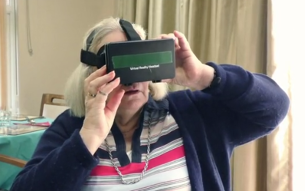
You Can Help Bring Memories to Life for Alzheimer’s Sufferers in Impressive VR Project

Could virtual reality be the key to unlocking dementia sufferers from the isolating prison of their disease? The Wayback is a new project that aims to trigger happy memories of years past as well as connecting sufferers and their carers with a common experience.
A team of people from across the advertising industry have grouped together to use the power of VR to make life better for people with dementia – and their carers, friends and loved ones. By recreating intensely emotional, shared experiences from decades past, virtual reality can be an incredibly powerful tool. Dementia sufferers – who become trapped in the past – can enjoy experiences that are comforting and familiar. And families and carers, often keen to keep their loved ones in the present, can instead step back in time and connect.
The Wayback takes its cues from Reminiscence Therapy, in which props, music and costumes from years past are used to help sufferers – but the team hope that eventually they’ll be able to supplement that with free-to-access VR experiences.
As Elisa Chami-Castaldi, a strategic planner at Grey London, explains, the project is a personal one for all those involved. The original idea came from Dan Cole, a Grey creative who had cared for his own father as he suffered Alzheimer’s, and although it’s not an official Grey project, the agency is supportive of it. Also involved are Thomas Thomas Films, MPC, 750mph and The Quarry.
“We’ve all had a personal experience with it, whether it’s a loved one that we’ve either cared for or have seen slowly deteriorate, so it was quite easy for Dan and Andy [Garnett, a fellow creative at Grey] to pull people in. We all cared, we found time in the evenings and weekend because we had an emotional investment in the project,” says Elisa.
For Trent Simpson, Head of Production at Thomas Thomas Films, The Wayback also represents a way for younger generations to connect with their elderly relatives who are struggling to comprehend the present.
“My grandfather had dementia but, because I was so young in his decline, I didn’t really understand what he was talking about. He was talking about memories that were so removed from my world. But with the VR experience, you can both experience the memories; as a child, I’d be able to talk about it. It’s quite powerful.”
The team also got support from Dementia Care Matters founder, Dr David Sheard, and were invited to visit a care home in order to learn about what kind of content would be most effective.
For example, they found that people at different stages of the disease would be responsive to different formats. At the early stages, a fully immersive VR experience could be just the thing to relax and stimulate sufferers, to initiate conversation and connection. However, in the very late stages of the disease, it could be more effective to offer up simple, focused shots of specific details and to avoid over stimulation.
Another insight was that it would be crucial to have an exacting attention to detail when creating the experiences. An authentic fabric pattern on a dress or a particular popular dance step, for example, might be just the thing to trigger a memory.
The team know that VR is a medium that will be particularly effective as they were able to work with carers and sufferers. Trent recalls showing patients the headsets for the fist time: “Being down there when we were showing random bits of content, we saw real proof that it could incite conversation. One of the fears was that the VR headset could feel foreign to them, because it isn’t something that has been in their lives, but actually they were really responsive to it.”
During this research phase, the team used pre-existing VR pieces – for example one elderly gentleman known as ‘The Captain’, transformed from stern and serious to relaxed and talkative upon seeing footage of elephants in Africa. It triggered memories of going on safari in his younger days. However, few VR experiences currently exist that are tailored to the over-70 age group. One of the characteristics of dementia is that newer memories are the quickest to disappear, so there’s a need for experiences that relate to more historical events – hence the importance of The Wayback.
For now, a concept film has been created and a Kickstarter launched. The team need to raise £35,000 in order to create the first VR experience in the series – a recreation of a 1953 street party celebrating the coronation of Queen Elizabeth II. But the ambition for The Wayback is much bigger.
“The longer term mission, if we could have a Shangri La tomorrow, would be to have a platform that would be free for all, so carers, loved ones, friends, people living with dementia, could access VR content. It would be free content that works in the way that reminiscence therapy works,” explains Elisa. She adds that the team want it to be a very open and collaborative project and they’re open to people from across the industry getting involved.
To help make sure the team can start producing the first film, head to Kickstarter here.













